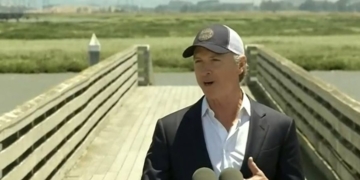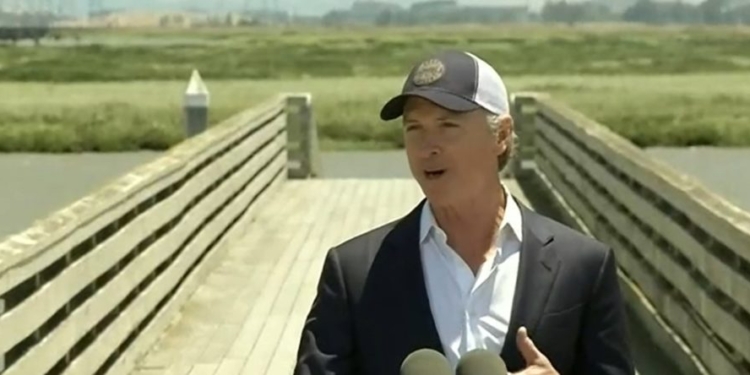California’s latest law cracking down on fuel refiners in the state is likely to drive already-high prices at the pump even higher, according to several energy experts.
Democratic California Gov. Gavin Newsom signed ABX2-1 into law on Oct. 14, empowering state bureaucrats to require refiners to maintain certain inventory levels in an effort to prevent alleged price gouging by energy companies and adding to the list of anti-fossil fuel industry policies and regulations in the state. Along with rules already on the books, the new policy will further squeeze refiners and fuel producers, undermine supply and send prices even higher with the help of other costly rules on the books regulating the fossil fuel industry, according to several energy sector experts.
At about $4.64, California already has the highest per-gallon gas prices of any state in the U.S., according to AAA gas price data. In the week since the bill became law, Phillips 66 announced that it plans to close one of its refineries in the Los Angeles area in 2025, meaning that one of California’s nine refineries and 8% of the state’s available refining capacity will be closing down, according to the Los Angeles Times.
“Price spikes have cost Californians billions of dollars over the years, and we’re not waiting around for the industry to do the right thing — we’re taking action to prevent these price spikes and save consumers money at the pump,” Newsom said upon signing the bill. “Now, the state has the tools to make sure they backfill supplies and plan ahead for maintenance so there aren’t shortages that drive up prices. I’m grateful to our partners in the Senate and Assembly for acting quickly to push this forward and help deliver relief for Californians.”
However, Patrick De Haan, a prominent gas market analyst who writes for GasBuddy, rejects Newsom’s contention that energy companies are ripping off Californians. He instead places most of the blame for the state’s high energy costs at the feet of overzealous regulators and politicians.
“It can’t be understated — it’s not the oil industry ‘screwing you’ in California, it’s hell-bent politicians with layers and layers of costly legislation,” De Haan wrote in an Oct. 15 post to X, formerly Twitter. “It’s more Newsom’s government than anything.”
De Haan also expects other refiners to follow in Phillips 66’s footsteps and close down California refineries in the wake of ABX2-1’s passage, he wrote in a separate post. About 90% of the gasoline consumed in the state is refined at in-state facilities, according to the California Energy Commission, so prices would likely increase in the event of more refinery closures as supply decreases and if all else is held equal.
“They keep running around talking about how companies are price gouging. In reality, it’s the politicians. You just wonder when people are going to wake up,” Dan Kish, a senior research fellow at the Institute for Energy Research, told the DCNF. “What they’re clearly doing is they want all electric vehicles, and so they’re driving up the cost of gasoline every way they can to do it. They’re making gas more scarce and more expensive, and they hope that this will help ‘nudge,’ as they like to say, people into doing what they want them to do, rather than listen to the citizens.”
Newsom’s office disputes that state policy is primarily responsible for driving up gas prices in the state.
“Gas prices overwhelmingly consist of crude oil costs and industry profits,” a spokesperson for Newsom said in an email to the Daily Caller News Foundation. “Analyses have shown that the legislation last week will save Californians upwards of billions of dollars every year,” the spokesperson continued, further referring the DCNF to Newsom’s remarks at a press conference announcing the new refinery law.
Andy Walz, president of downstream, midstream and chemicals for Chevron, slammed ABX2-1 in an Oct. 8 letter to California lawmakers describing how the bill is likely to increase costs at the pump for consumers in a misguided attempt to prevent supposed price gouging. In the letter, Walz wrote that the new law is evidently political rather than practical, and that it will make gas even more expensive for Californians in the long-run.
“California’s policy choices have led to a gasoline shortage by driving suppliers away,” Walz wrote. “We have a shortage of incentivizing policy for additional refiners and supply. California, stop making consumer conditions worse.”
The new law for refineries is not the only policy in California that is expected to increase gas prices in the near future.
The California Air Resources Board (CARB) will decide after Election Day whether to tighten the state’s Low Carbon Fuel Standard (LCFS), a program that aims to decrease the carbon intensity of transportation fuels in the state, according to Politico. CARB initially estimated that doing so could raise prices at the pump by 47 cents per-gallon, though CARB subsequently walked back that projection.
However,
Additionally, California has a statewide cap-and-trade program that sets a declining limit on major sources of emissions across the state to incentivize corporations to adopt low-emitting green technologies. Walz named California’s cap-and-trade program as one of the most aggressive regulatory schemes in the state that contributed to his company’s August decision to relocate its headquarters to Texas and out of California in an August interview with the DCNF.
“There are two reasons that gas is more expensive in California, and neither of them have to do with price gouging. The first reason, which we’re all very familiar with, is the extra taxes that are added on,” Edward Ring, the director of water and energy policy for the California Policy Center, told the DCNF. “When you take all of the state taxes, fees and programs, you’re going to add another $1.23 to the price of a gallon of gas, and that’s not including the 18 cents a gallon of federal excise tax.”
“Now, the other part, which is worth mentioning, to be fair, is California does have a different formulation that they require for gasoline that does make it a little bit more expensive to refine, but again, that’s not that big a factor,” Ring continued. “If California wants to spare its citizens the high cost of gas, they should maybe figure out how to run the state for a little bit less money, because they’re doing a terrible job anyway, and they could lower these taxes.”
CARB did not respond to a request for comment.
All content created by the Daily Caller News Foundation, an independent and nonpartisan newswire service, is available without charge to any legitimate news publisher that can provide a large audience. All republished articles must include our logo, our reporter’s byline and their DCNF affiliation. For any questions about our guidelines or partnering with us, please contact [email protected].



























 Continue with Google
Continue with Google